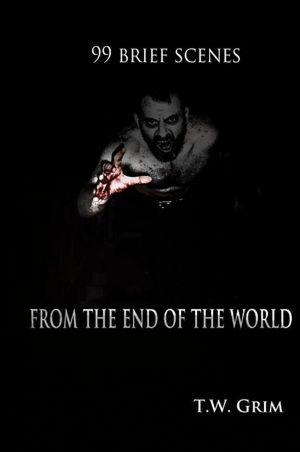First, though, I want to do a brief review of the book, because it's my party and I'll review if I want to. Review if I want to.
99 Brief Scenes From the End of the World (henceforth 99S) is,
and believe me when I say that I don’t use this term lightly or regularly,
absolutely brilliant. It combines a technique which I've never seen before,
writing 99 stories each several pages in length, with a nearly breathless but
nonetheless well-paced tone. I know I’m
supposed to be in superlative rehab, but I'm jumping off the wagon with both feet because it really is the best thriller I’ve
ever read and in my top 5 books written within my
lifetime. It is also very possibly the most blatant and uncompromising look at
the beauty which lies in ignoring the reader.
Read it, and if you don’t love it quit reading and take up
another hobby because you are clearly just plain not fucking cut out for it.
As for the cultural context, the Not Review portion of this
post, 99S was originally written as a serial on Reddit, a site which is
something like a sequel to that far more famous, or perhaps infamous, hive of
scum and villainy, fiction and falsehood from the olden days of the web. What
that means, for Reddit that is, is that despite its toothless debility it is still in many ways a microcosm of internet culture, a mirror of
the inherent nature of a people which hide at the bedrock center of hundreds of
web communities, providing us with everything from lolcats and trollception to unbounded intellectual inquiry and sociopolitical activism.
99S embodies that same mindset: Digressive, irreverent,
almost combatively uninterested in the comfort of anyone, anywhere; in short, all
that the web is at its best and its worst, with nothing in between. It is a
book which could not exist without untold millions of 1’s and 0’s and the
culture they spawned. The beauty in this is that, unless I miss my guess, the occurrence is entirely unintentional. The book isn’t about the internet, doesn’t say a single word directly about
internet culture; it was simply birthed by a creator possessed
of, or perhaps possessed by, a cultural phenomenon beyond his control.
As writers we are in no way immune to the influences of
culture. Those of us whose egotism is exceeded only by our single-minded
dedication to a goal very nearly unattainable often like to pretend that we
exist in a world unto ourselves, somewhere between a fantasy and a vacuum, but at the risk of disabusing some pleasant notions, no man is island. I would go so far as
to say that we who fancy ourselves artists are more so mirrors of the time and place in which we live,
inadvertently exposing our cultural heritage for the viewing public in a way
which is inextricable not just from the self but also from the collective. From
what some might call the collective unconscious, the zeit- or volksgeist, or if they're dumb and whining at me (as is the wont of so many), the esprit d'corps.
The question, then, is how much is a work truly ours, as writers? Does the fact that we are often
channeling some unseen force, drawing our story not entirely from ourselves but
from the world we live in mean that in some way the work is the property of that collective unconscious? This is not a
rhetorical question.
As an extension of all this, we must face the topic which has occupied my mind for what would be fairly described as an embarrassing amount of time if I was capable of embarrassment; I am consumed by curiosity as to what the literary analysts will (or would...) find in
my work, what voices enter unbidden...
So, I’ll issue this challenge, through not a spirit of
generosity I’ve never possessed but rather in pursuit of what only you may give
me, my dear readers:
If you fancy yourself a literary sort, the sort of person
who finds things the author cannot, email me and I’ll have a PDF of
anything published in your hands in hours, God willing, with the sincere
hope that you will return to me a work of sublime insight somewhere between 1
sentence and a graduate thesis.
In the meantime, abandon your thoughts of my work, and bury
yourself in Mr. Grim’s. It is, in a word, unapologetic, reveling carelessly in a
quagmire of the sort of guiltless imperfection which stands in stark contrast
to self-conscious literary vanity, a
paragon of the nearly imperceptible.
I didn’t care for the ending, but you know what? Fuck my
ending. And fuck yours, too. Genius answers to no one, or in failing to abandons
itself to the mob.

